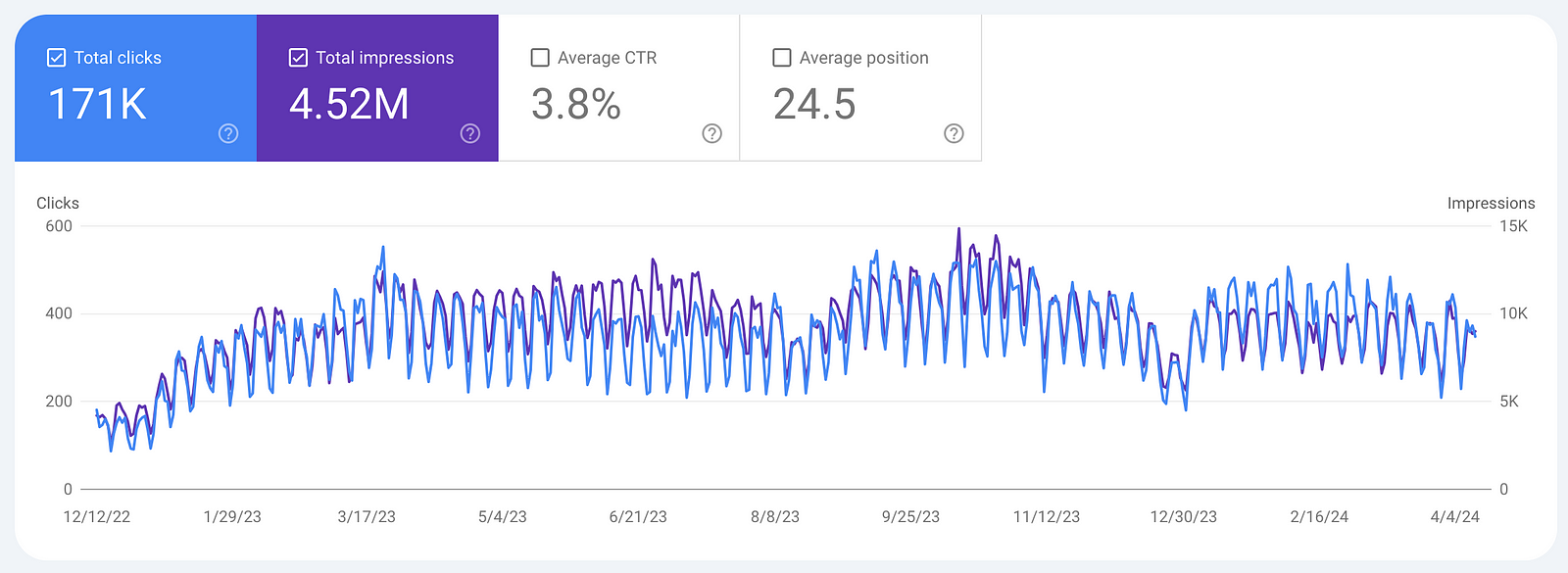3 Unusually Painful Mistakes on My Side Project Journey to 100K Users
 Marius Bongarts
Marius Bongarts
Mistakes are inevitable when building side projects. Learn from my 3 biggest mistakes to take a shortcut on the path to a successful side hustle.
I have not failed. I’ve just found 10,000 ways that won’t work. — Yevgeniy Brikman
The biggest mistake many people make is to believe that mistakes are bad. Yet they are a key reason for success. That’s why I’m not embarrassed by mine and I’m happy to share them with you.
I assure you: You will still make many mistakes — but different ones.
Winners are not afraid of losing. But losers are. Failure is part of the process of success. People who avoid failure also avoid success.
— Robert Kiyosaki in Rich Dad Poor Dad
1. Never Questioning Growth
You learn a lot when building on the side. Take Marketing and Search Engine Optimization (SEO), for instance — they’re crucial for any successful business.
But here’s the thing nobody talks about: it’s not all about expanding all the time. Sometimes, the smart move is to focus on improving your product and making your customers happier.
Your product should be so good that even your competitors recommend it. —Elon Musk
For me, learning about SEO was like an addiction. I dug deep into SEO and shared my learnings in my articles.
Soon I gained millions of impressions on Google and hundreds of thousands of clicks for web-highlights.com:

Google Search Performance for web-highlights.com.
It was amazing to gain such traffic and my user base grew a lot. Best of all: It was free marketing.
However, too much marketing can lead to neglecting the improvement of the actual product. I was scaling a product that was not ready for the masses yet. I knew there were issues. But, as my time was limited I couldn’t fix them because I focused too much on marketing.
I am a true believer that if you build an exceptional product it will sooner or later be valued and recognized. In Forget About Marketing. Focus on Building An Awesome Product I discussed in detail why you should first build an exceptional product before you focus on growth.
Sometimes the best plan is focused on your current customers’ success, not on chasing leads and growth. — Paul Jarvis in Company of One
Recently, I saw a great Tweet about it:
While both strategies are viable, I feel like doing marketing for a “shitty” product shouldn’t be something you should aim for.
A few months ago, when I realized that, I stopped any marketing efforts and completely focused on improving my Chrome Extension. Soon my app became significantly faster, more reliable, and way more enjoyable. The user feedback was amazing.
Create something amazing and people will talk about it. Growth will follow. Slowly but steadily.
Trying to avoid mistakes at all costs, or pretending that mistakes never happen, is not a viable strategy. More realistic is having a plan for when they do happen. — Paul Jarvis in Company of One
2. Not Building An Audience Sooner
Building a community around your business is one of the most important things you can do.
I feel uncomfortable posting on LinkedIn and Twitter. I don’t like putting myself out there and posting stuff about things most of my LinkedIn friends don’t even care about. At least that’s what it often feels like for me.
If you’re a solopreneur like me you might feel the same way. Still, I can only emphasize the importance of building an online audience.
Get out of your comfort zone and start creating value. Join the 1% on the internet!
According to the 1% rule, about 1% of Internet users create content, while 99% are just consumers of that content. — wikipedia.org
I wish I had done this sooner. Everyone has something to share that has value for others.
If you’re building an AI tool, write about how to set up the OpenAI API. If you’re selling clothes, write about mode trends. For example, my very first Medium article was a guide on creating a Chrome Extension — because that’s what I do, building a Chrome Extension.
I like the idea of a 1000 True Fans by Kevin Kelly:
To be a successful creator you don’t need millions. You don’t need millions of dollars or millions of customers, millions of clients or millions of fans. To make a living as a craftsperson, photographer, musician, designer, author, animator, app maker, entrepreneur, or inventor you need only thousands of true fans. — kk.org
It does not matter on which platform or what kind of content you create. Just make sure to create value for your audience.
A true fan is defined as a fan that will buy anything you produce. — kk.org
Soon you will have a follower audience trusting you and willing to buy your products.
3. Not Documenting Everything
I was 22 when I started building Web Highlights. After one year, there were only 10 users. Why would you create documentation for a tool no one uses?
I am not saying you should create documentation the moment you spin off your new side project and validate your idea. However, you should not miss the point when your idea turns into business.
That’s the point where you should document every single process to not make your business completely rely on you.
I have missed that point.
If you don’t document how your business works, how will someone be able to run it without you? Therefore, you must write down every single process as part of your company’s how-to guide. — The E-Myth Revisited (Blinkist Summary)
I was naive. Probably like most solopreneurs it didn’t make sense to me to write documentation for a project only I was working on. Honestly, even if someone had told me, I likely wouldn’t have listened.
The points I failed to grasp were that by not writing documentation:
you’re shutting the door for others to work on the project
your business is much more valuable when well-documented, as it’s far more attractive to buy
documented processes help you save time and identify where things can be automated.
The first two points are crucial. Even if I’m not thinking about hiring others for the project right now, writing documentation significantly boosts the business’s value if you ever consider selling it.
If your business’s systems are designed to work in the simplest and most efficient way, anyone can run the business, and thus it is appealing to buy. — The E-Myth Revisited (Blinkist Summary)
I am trying to catch up but it’s a lot of work.
I do now understand the importance of documenting every single step of a business and I am trying to catch up. It’s just that I could have saved so much time.
Most solo entrepreneurs probably skip writing documentation when they start. That’s fine initially, but if you’re serious about growing your business, it’s best to begin as soon as you can. Perhaps you should, especially if your ultimate aim is to establish a lasting business that you might eventually consider selling.
If you don’t document how your business works, how will someone be able to run it without you?
Thanks for reading!
Want to learn more about how I scaled my Chrome Extension to 100k+ users as a solopreneur? Subscribe to my newsletter or follow me on LinkedIn and Twitter.
Subscribe to my newsletter
Read articles from Marius Bongarts directly inside your inbox. Subscribe to the newsletter, and don't miss out.
Written by

Marius Bongarts
Marius Bongarts
❤️ User happiness > hyper-growth 👨💻 Building web-highlights.com (80K+ users | 1K MRR) ⭐️ 3x Top Writer on Medium: medium.com/@mariusbongarts